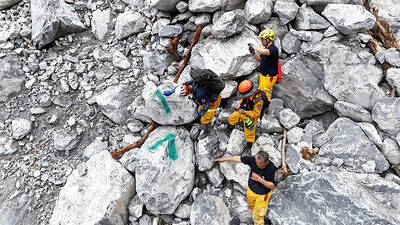The Judicial Yuan on Friday held its first outdoor mock trial as part of its efforts to publicize the new citizen judge system.
The mock trial held in front of Tainan’s Madou Daitian Temple (麻豆代天府) featured three judges from the Tainan District Court, six citizen judges chosen from among local residents, and National Tseng-Wen Agricultural and Industrial High School students serving as prosecutors, the Judicial Yuan said in a statement.
Before the mock trial began, Judicial Yuan Secretary-General Lin Hui-huang (林輝煌) said that starting in 2023, most citizens will have the chance to be selected as a citizen judge, and that a series of mock trials is aimed at helping the public become familiar with the court process.
The case presented during Friday’s trial involved a neighbors’ quarrel that turned violent, with one party being stabbed by the other.
The prosecutors accused the defendant of attempted murder, while the defendant argued it was a case of assault.
The panel of judges found the defendant guilty of assault, handed down a suspended 10-month prison sentence, with a five-year probation period, and ordered the defendant to pay NT$300,000 (US$10,708) in compensation to the victim.
More mock trials are being planned for Aboriginal villages and rural areas, the Judicial Yuan said.
The 113-article National Judge Act (國民法官法) was passed by the legislature on July 22 as part of the government’s plan to introduce public participation in court trials, after several court decisions in recent years were criticized for not meeting public expectations.
The act, which takes effect in 2023, stipulates that citizen judges will work on cases involving homicides and offenses carrying a penalty of at least 10 years in jail at district courts, but would be limited to non-juvenile or non-drug related criminal trials.
Guilty verdicts or death sentences can only be handed down when six of the nine judges agree on them, including at least one professional judge.
All other sentences must be agreed upon by a majority of at least five of the nine judges, including one professional judge, the act states.

Former president Ma Ying-jeou’s (馬英九) mention of Taiwan’s official name during a meeting with Chinese President Xi Jinping (習近平) on Wednesday was likely a deliberate political play, academics said. “As I see it, it was intentional,” National Chengchi University Graduate Institute of East Asian Studies professor Wang Hsin-hsien (王信賢) said of Ma’s initial use of the “Republic of China” (ROC) to refer to the wider concept of “the Chinese nation.” Ma quickly corrected himself, and his office later described his use of the two similar-sounding yet politically distinct terms as “purely a gaffe.” Given Ma was reading from a script, the supposed slipup

Former Czech Republic-based Taiwanese researcher Cheng Yu-chin (鄭宇欽) has been sentenced to seven years in prison on espionage-related charges, China’s Ministry of State Security announced yesterday. China said Cheng was a spy for Taiwan who “masqueraded as a professor” and that he was previously an assistant to former Cabinet secretary-general Cho Jung-tai (卓榮泰). President-elect William Lai (賴清德) on Wednesday last week announced Cho would be his premier when Lai is inaugurated next month. Today is China’s “National Security Education Day.” The Chinese ministry yesterday released a video online showing arrests over the past 10 years of people alleged to be

THE HAWAII FACTOR: While a 1965 opinion said an attack on Hawaii would not trigger Article 5, the text of the treaty suggests the state is covered, the report says NATO could be drawn into a conflict in the Taiwan Strait if Chinese forces attacked the US mainland or Hawaii, a NATO Defense College report published on Monday says. The report, written by James Lee, an assistant research fellow at Academia Sinica’s Institute of European and American Studies, states that under certain conditions a Taiwan contingency could trigger Article 5 of NATO, under which an attack against any member of the alliance is considered an attack against all members, necessitating a response. Article 6 of the North Atlantic Treaty specifies that an armed attack in the territory of any member in Europe,

The bodies of two individuals were recovered and three additional bodies were discovered on the Shakadang Trail (砂卡礑) in Taroko National Park, eight days after the devastating earthquake in Hualien County, search-and-rescue personnel said. The rescuers reported that they retrieved the bodies of a man and a girl, suspected to be the father and daughter from the Yu (游) family, 500m from the entrance of the trail on Wednesday. The rescue team added that despite the discovery of the two bodies on Friday last week, they had been unable to retrieve them until Wednesday due to the heavy equipment needed to lift